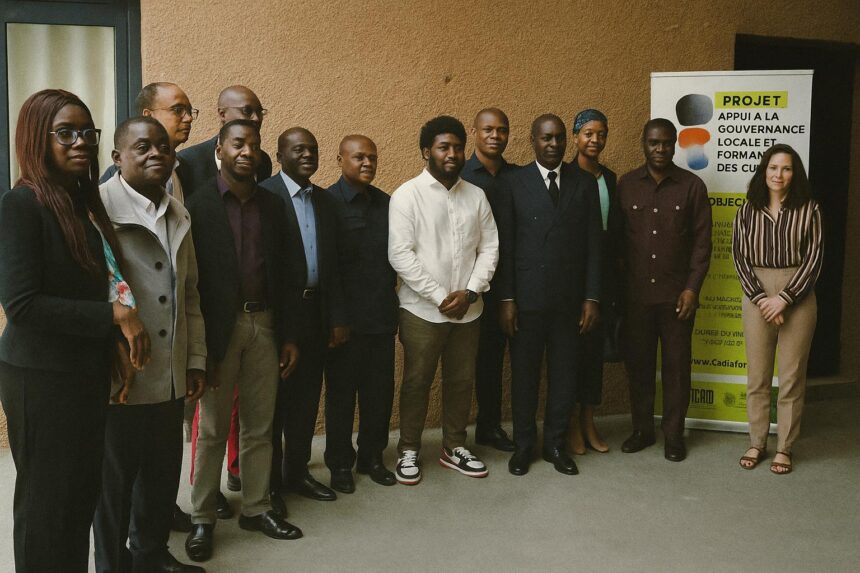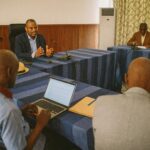An evolving paradigm of decentralisation in Congo
Since the 2003 constitutional amendments opened the door to deeper decentralisation, successive Congolese administrations have sought to translate national development blueprints into tangible municipal projects. The government’s Plan national de développement 2022-2026 explicitly calls for the “territorialisation” of public policy, tasking departmental and communal councils with acting as conduits between central ministries and neighbourhood committees. International partners such as the United Nations Development Programme and the African Development Bank have repeatedly underscored that local absorption capacities will determine the credibility of fiscal federalism in Central Africa (UNDP 2024; AfDB 2023).
The Brazzaville workshop: substance over symbolism
Against this backdrop, the 11 July 2025 workshop convened by the Centre d’actions pour le développement acquired more than ceremonial significance. Thirty participants—mayors, prefectural experts, civil-society advocates and line-ministry focal points—gathered in the capital to dissect community action plans and local development plans and to submit their methodologies to collective scrutiny. Guerschom Gobouang, steering the session, observed that conventional top-down templates often render rural concerns invisible, while Trésor Nzila emphasised that local councillors are “constitutionally entrusted with the custodianship of collective aspirations”.
Participatory planning: from rhetoric to praxis
Participants agreed that the conventional summit-to-base cascade, although administratively expedient, risks perpetuating infrastructural inequities between districts such as Moungali and Makélékélé. A consensus emerged around adopting a base-to-summit grammar in which village assemblies draft preliminary matrices that are then harmonised at arrondissement level. This approach resonates with regional best practices recorded in Rwanda’s Imihigo performance contracts and Ghana’s composite budgeting system, both of which have elevated citizen trust indices according to Afrobarometer 2023.
Crucially, the workshop insisted on embedding human-rights indicators—access to potable water, maternal health coverage, land-use transparency—into each plan. By positioning rights as measurable deliverables rather than abstract entitlements, local authorities can align with the National Human Rights Commission’s monitoring metrics without creating parallel bureaucracies.
Fiscal and institutional levers for durable impact
Several speakers highlighted that methodological breakthroughs must be matched by predictable financing. The 2025 draft Finance Law already earmarks 15 % of domestically mobilised revenues for intergovernmental transfers. Analysts from the Congolese Observatory of Public Finance noted that timely disbursement will be essential if community projects—from feeder roads in Pool to market rehabilitation in Likouala—are to avoid mid-year standstills.
Institutional clarity was another leitmotif. The Ministry of Territorial Administration’s circular of April 2025 streamlines the vetting process for communal budgets, shrinking approval time from six to three months. Such regulatory acceleration, applauded by several municipal treasurers present, should enable the two-year UN Democracy Fund programme to operate within its allotted timeline and to produce the audit evidence demanded by external donors.
Diplomatic ramifications and regional resonances
International observers view Congo-Brazzaville’s experiment as both a domestic governance exercise and a soft-power asset. The Economic Community of Central African States has invited Brazzaville to present preliminary outcomes at its 2026 summit on local resilience. By showcasing participatory planning anchored in national ownership, the Republic reinforces its reputation as a pragmatic consensus-builder—a trait that has already proved valuable in mediation efforts along the Bangui-Ndjamena corridor.
For foreign investors, granular development plans offer a cartography of pipeline opportunities, from agro-processing clusters near Oyo to eco-tourism corridors along the Kouilou River. The harmonisation of communal and departmental priorities may reduce due-diligence uncertainty and complement the government’s recently adopted Public-Private Partnership Code.
Outlook for inclusive local stewardship
By threading participatory diagnostics into statutory planning cycles, Congo-Brazzaville positions itself at the intersection of democratic legitimacy and administrative efficiency. The Brazzaville workshop distilled a compelling argument: community voices, once marginal, can become strategic assets in meeting Sustainable Development Goal benchmarks. Continued political backing, especially through consistent budget transfers and capacity-building, will be decisive.
Ultimately, the workshop’s call for shared responsibility aligns with President Denis Sassou Nguesso’s stated ambition to forge a “République solidaire” in which the asphalt of national highways meets the micro-aspirations of every quartier. Observers will hence be watching the 2026 budget session to gauge whether the rhetorical momentum built in July translates into asphalt laid, classrooms roofed and water points drilled across the Congolese landscape.





















